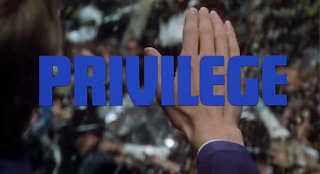Directed by Peter Watkins after The War Games, Privilege
proved another controversial and challenging film from the director and one
that resonates ever louder today in societies controlled by manufactured distractions,
in the arts, society and politics. It’s not just pop that’s confected but
outrage and dissatisfaction with other parts of society, political and trading
alliances and even specific members of the royal family.
The American philosopher Neil Postman wrote a book called
Amused to Death long before Roger Water wrote an album based on its arguments.
The bottom line is that our culture is endangered when “… a population
becomes distracted by trivia, when cultural life is redefined as a perpetual
round of entertainments, when serious public conversation becomes a form of
baby-talk, when, in short, a people become an audience, and their public
business a vaudeville act, then a nation finds itself at risk...”
 |
| Mr Jones |
In Walker’s film set in the then near future of the
seventies, pop star Steven Shorter (Paul Jones) is the most popular figure in
the country who is being used to help control the mood of his fans. Shorter’s
stage act is dangerous and drawn from his own experience of being incarcerated
for a minor crime. He is brutalised by burly stunt men dressed as prison
warders and policemen and his fans are driven to a frenzy.
This seemingly anti-establishment narrative is a double
bluff by the powers that be who only want to generate a certain amount of
anger; enough to amuse the masses and prevent them from more focused thoughts
and action with respect to the actual state of the country.
This double bluff fantasy leaves Steven numb and it’s no
slight on Paul Jones’ acting ability to say he plays it well. Watkins knew what
he was doing in casting a pop star in this role as well as a famous fashion
model, Jean Shrimpton as an artist, Vanessa Ritchie who is hired to paint his
portrait. The limitations of both work perfectly well in the film as life
begins to swim uncomfortably fast for both – the public would also have identified
with them and potentially felt more identification with their alienation and
abuse.
 |
| Jean Shrimpton |
As it is the doe-eyed super model is perfect as another intentional
thought experiment; giving Stephen someone to identify with, someone who will
take the edge of his experience and his free will; a cold and deliberate act
offering his someone warm and caring. But surely, he’ll see through it? Stephen’s
problem that his life is under control and he is being moved around too fast to
think let alone mount a response.
This is no doubt similar to the way The Beatles and The Stones
felt at the peak of their mad fame and even Paul Anka who was the focus of Wolf
Koenig and Roman Kroitor’s 1962 documentary, Lonely Boy, which Watkins studied
extensively.
Privilege is cast as a documentary and has the stripped-down
aesthetics of cinema verité making us as much the audience as the screaming
fans. We too are shocked by the violence of Stephen’s stage show as he is
handcuffed and bloodied by the fake prison screws. Jones’ unease is
exceptionally well captured by Watkins and the film is by no means a quaint period
piece. Quite the contrary, as he is totally controlled by manager Martin
Crossley (Jeremy Child), PR Alvin Kirsch (Mark London), record company exec
Julie Jordan (Max Bacon), and money man Andrew Butler (William Job).
 |
| Uncredited bit part from Lucy Fleming on the left, later to star in Survivors... |
Steven adds his brand to anything from apples to nightclubs,
shopping centres and grocery brands; he’s very much a commodity himself.
The music was composed by Mike Leander who would have
success with his own product, Gary Glitter, in the seventies and his key song
here, Set Free becoming a hit for Pattie Smith in the late 70s as Privilege
(Set Me Free). It’s also hard to watch the film without thinking of Malcolm
McDowell in A Clockwork Orange – an individual the state wants to brainwash
and use for their own ends.
Privilege is one of the key films that show the dissatisfactions
of the swinging sixties through all the flowers and an ostensibly successful
underground movement that may have produced some great art but which was firmly
back in its box by the time Glitter took over. Still, Steven is ultimately
defiant and so was the country’s alternative culture with Punk, new wave and
the ongoing battle to sidestep the powers that be.
 |
| Buy British apples! |
Dusty Verdict: Privilege is proto punk but
also representative of the culture of resistance always present in Britain; we
need it now as much as then even if it may only be illusory and temporary you
have to keep believing in the freedom Steven really wanted. Reviews at the time
were universally defensive – see The S*n’s comment at the top – but also proven
quite wrong. Watkins was as usual, ahead of the game.
The film is available on the BFI’s brilliant Flipside
series as a DVD/Blu-ray with lashings of extras. One of the best films about
pop and pop cultural appropriation. Go on, set yourself free…






No comments:
Post a Comment